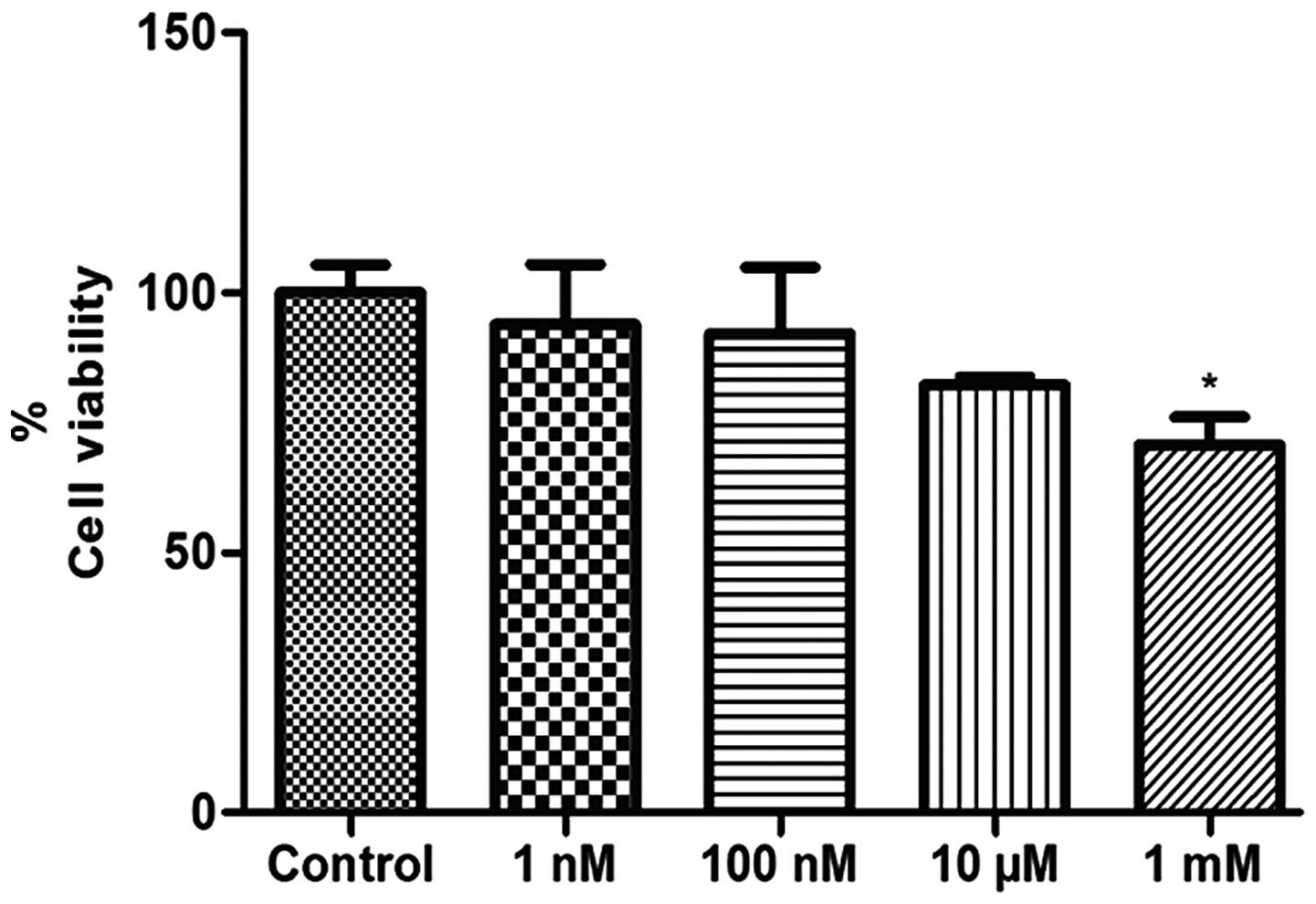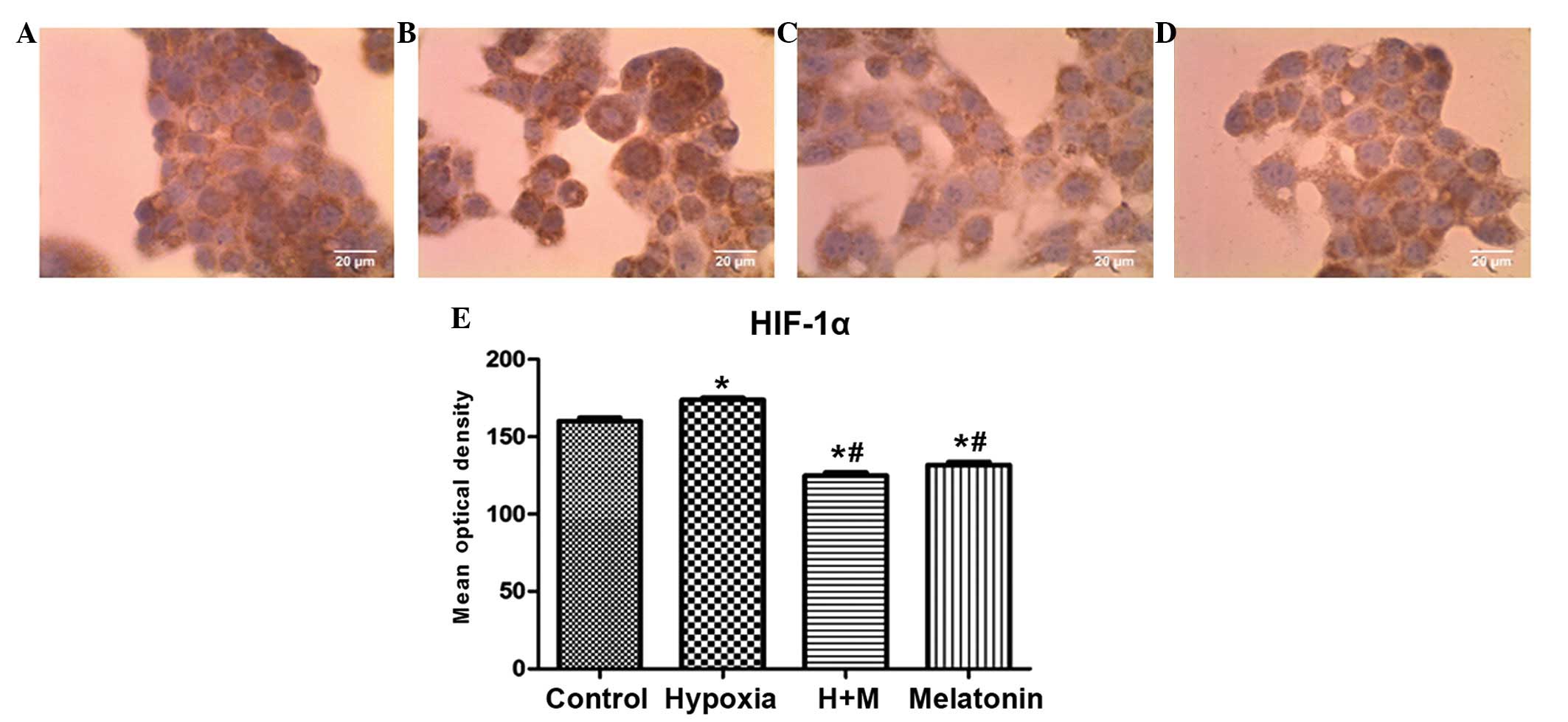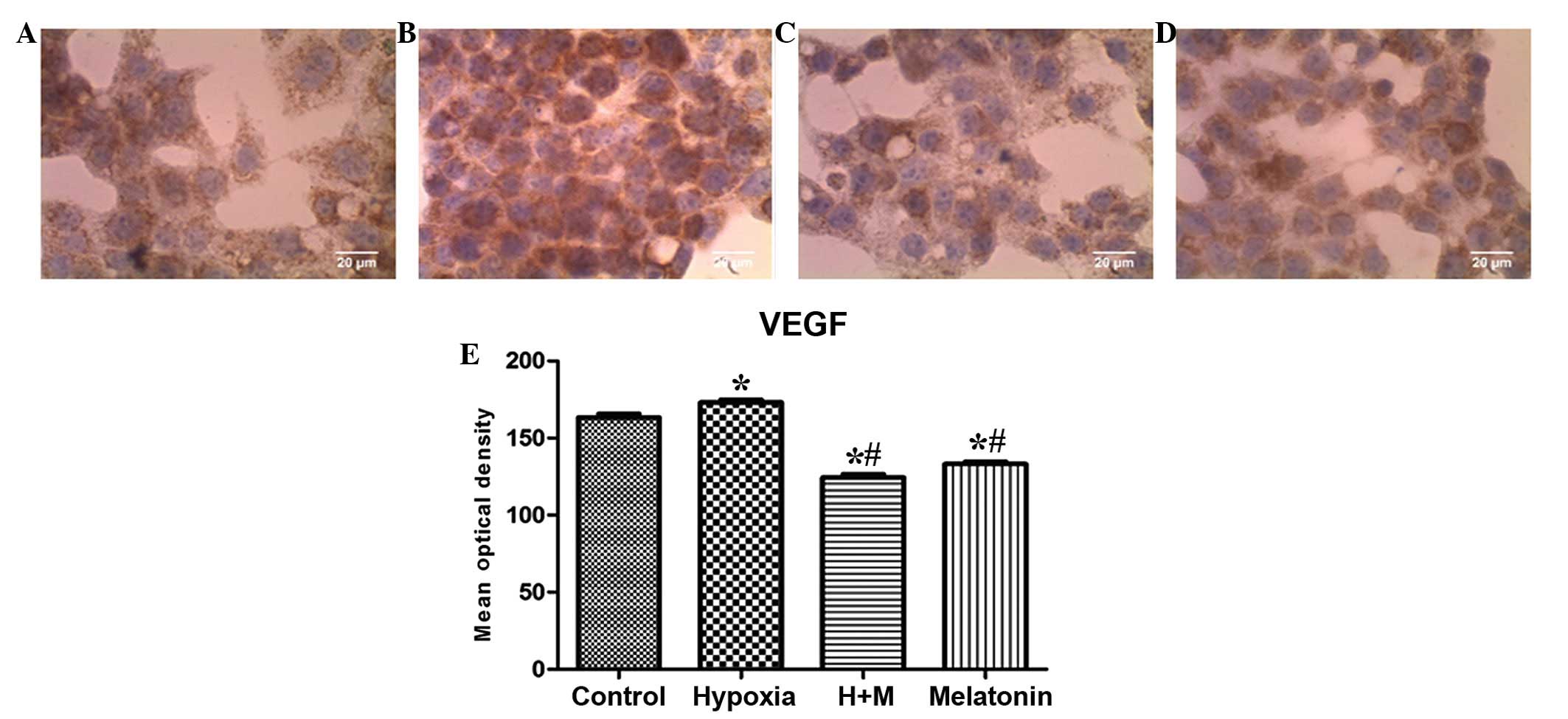|
1
|
Jemal A, Center MM, DeSantis C and Ward
EM: Global patterns of cancer incidence and mortality rates and
trends. Cancer Epidemiol Biomarkers Prev. 19:1893–1907. 2010.
View Article : Google Scholar : PubMed/NCBI
|
|
2
|
Yuan GJ, Li QW, Shun SL, Wang WM, Jiang S
and Xu XM: Hyperthermia inhibits hypoxia-induced
epithelial-mesenchymal transition in HepG2 hepatocellular carcinoma
cells. World J Gastroenterol. 18:4781–4786. 2012. View Article : Google Scholar : PubMed/NCBI
|
|
3
|
Sun XT, Yuan XW, Zhu HT, Deng ZM, Yu DC,
Zhou X and Ding YT: Endothelial precursor cells promote
angiogenesis in hepatocellular carcinoma. World J Gastroenterol.
18:4925–4933. 2012. View Article : Google Scholar : PubMed/NCBI
|
|
4
|
Karamysheva AF: Mechanisms of
angiogenesis. Biochemistry (Mosc). 73:751–762. 2008. View Article : Google Scholar : PubMed/NCBI
|
|
5
|
Lv D, Cui PL, Yao SW, Xu YQ and Yang ZX:
Melatonin inhibits the expression of vascular endothelial growth
factor in pancreatic cancer cells. Chin J Cancer Res. 24:310–316.
2012. View Article : Google Scholar : PubMed/NCBI
|
|
6
|
Poon RT, Ng IO, Lau C, Zhu LX, Yu WC, Lo
CM, Fan ST and Wong J: Serum vascular endothelial growth factor
predicts venous invasion inhepatocellular carcinoma: A prospective
study. Ann Surg. 233:227–235. 2001. View Article : Google Scholar : PubMed/NCBI
|
|
7
|
Schoenleber SJ, Kurtz DM, Talwalkar JA,
Roberts LR and Gores GJ: Prognostic role of vascular endothelial
growth factor in hepatocellular carcinoma: Systematic review and
meta-analysis. Br J Cancer. 100:1385–1392. 2009. View Article : Google Scholar : PubMed/NCBI
|
|
8
|
Kallergi G, Markomanolaki H, Giannoukaraki
V, Papadaki MA, Strati A, Lianidou ES, Georgoulias V, Mavroudis D
and Agelaki S: Hypoxia-inducible factor-1alpha and vascular
endothelial growth factor expression in circulating tumor cells of
breast cancer patients. Breast Cancer Res. 11:R842009. View Article : Google Scholar : PubMed/NCBI
|
|
9
|
Flamant L, Notte A, Ninane N, Raes M and
Michiels C: Anti-apoptotic role of HIF-1 and AP-1 in paclitaxel
exposed breast cancer cells under hypoxia. Mol Cancer. 9:1912010.
View Article : Google Scholar : PubMed/NCBI
|
|
10
|
Dales JP, Beaufils N, Silvy M, Picard C,
Pauly V, Pradel V, Formisano-Tréziny C, Bonnier P, Giusiano S,
Charpin C and Gabert J: Hypoxia inducible factor 1alpha gene
(HIF-1alpha) splice variants: Potential prognostic biomarkers in
breast cancer. BMC Med. 8:442010. View Article : Google Scholar : PubMed/NCBI
|
|
11
|
Greenberg S and Rugo HS: Triple-negative
breast cancer: Role of antiangiogenic agents. Cancer J. 16:33–38.
2010. View Article : Google Scholar : PubMed/NCBI
|
|
12
|
Vordermark D, Kaffer A, Riedl S, Katzer A
and Flentje M: Characterization of carbonic anhydrase IX (CA IX) as
an endogenous marker of chronic hypoxia in live human tumor cells.
Int J Radiat Oncol Biol Phys. 61:1197–1207. 2005. View Article : Google Scholar : PubMed/NCBI
|
|
13
|
Park SY, Jang WJ, Yi EY, Jang JY, Jung Y,
Jeong JW and Kim YJ: Melatonin suppresses tumor angiogenesis by
inhibiting HIF-1alpha stabilization under hypoxia. J Pineal Res.
48:178–184. 2010. View Article : Google Scholar : PubMed/NCBI
|
|
14
|
Shen B, Chu Es, Zhao G, Man K, Wu CW,
Cheng JT, Li G, Nie Y, Lo CM, Teoh N, et al: PPARgamma inhibits
hepatocellular carcinoma metastasis in vitro and in mice. Br
J Cancer. 106:1486–1494. 2012. View Article : Google Scholar : PubMed/NCBI
|
|
15
|
Shirouzu Y, Ryschich E, Salnikova O,
Kerkadze V, Schmidt J and Engelmann G: Rapamycin inhibits
proliferation and migration of hepatoma cells in vitro. J
Surg Res. 159:705–713. 2010. View Article : Google Scholar : PubMed/NCBI
|
|
16
|
Aravalli RN, Cressman EN and Steer CJ:
Cellular and molecular mechanisms of hepatocellular carcinoma: An
update. Arch Toxicol. 87:227–247. 2013. View Article : Google Scholar : PubMed/NCBI
|
|
17
|
Katyal S, Oliver JH 3rd, Peterson MS,
Ferris JV, Carr BS and Baron RL: Extrahepatic metastasis of
hepatocellular carcinoma. Radiology. 216:698–703. 2000. View Article : Google Scholar : PubMed/NCBI
|
|
18
|
Luchetti F, Canonico B, Betti M,
Arcangeletti M, Pilolli F, Piroddi M, Canesi L, Papa S and Galli F:
Melatonin signaling and cell protection function. FASEB J.
24:3603–3624. 2010. View Article : Google Scholar : PubMed/NCBI
|
|
19
|
Cutando A, López-Valverde A,
Arias-Santiago S, De Vicente J and De Diego RG: Role of melatonin
in cancer treatment. Anticancer Res. 32:2747–2753. 2012.PubMed/NCBI
|
|
20
|
Di Bella G, Mascia F, Gualano L and Di
Bella L: Melatonin anticancer effects: Review. Int J Mol Sci.
24:2410–2430. 2013. View Article : Google Scholar
|
|
21
|
Park JW, Hwang MS, Suh SI and Baek WK:
Melatonin down-regulates HIF-1 alpha expression through inhibition
of protein translation in prostate cancer cells. J Pineal Res.
46:415–421. 2009. View Article : Google Scholar : PubMed/NCBI
|
|
22
|
Zhang Y, Liu Q, Wang F, Ling EA, Liu S,
Wang L, Yang Y, Yao L, Chen X, Wang F, et al: Melatonin antagonizes
hypoxia-mediated glioblastoma cell migration and invasion via
inhibition of HIF-1α. J Pineal Res. 55:121–130. 2013. View Article : Google Scholar : PubMed/NCBI
|
|
23
|
Alvarez-García V, González A,
Alonso-González C, Martínez-Campa C and Cos S: Regulation of
vascular endothelial growth factor by melatonin in human breast
cancer cells. J Pineal Res. 54:373–380. 2013.PubMed/NCBI
|
|
24
|
Carbajo-Pescador S, Ordoñez R, Benet M,
Jover R, García-Palomo A, Mauriz JL and González-Gallego J:
Inhibition of VEGF expression through blockade of Hif1α and STAT3
signalling mediates the anti-angiogenic effect of melatonin in
HepG2 liver cancer cells. Br J Cancer. 109:83–91. 2013. View Article : Google Scholar : PubMed/NCBI
|
|
25
|
Wang J, Hao H, Yao L, Zhang X, Zhao S,
Ling EA, Hao A and Li G: Melatonin suppresses migration and
invasion via inhibition of oxidative stress pathway in glioma
cells. J Pineal Res. 53:180–187. 2012. View Article : Google Scholar : PubMed/NCBI
|
|
26
|
Zhou Q, Gui S, Zhou Q and Wang Y:
Melatonin inhibits the migration of human lung adenocarcinoma A549
cell lines involving JNK/MAPK pathway. PLoS One. 9:e1011322014.
View Article : Google Scholar : PubMed/NCBI
|
|
27
|
Cos S, Fernández R, Güézmes A and
Sánchez-Barceló EJ: Influence of melatonin on invasive and
metastatic properties of MCF-7 human breast cancer cells. Cancer
Res. 58:4383–4390. 1998.PubMed/NCBI
|
|
28
|
Ortíz-López L, Morales-Mulia S,
Ramírez-Rodríguez G and Benítez-King G: ROCK-1 regulated
cytoskeletal dynamics participate in the inhibitory effect of
melatonin on cancer cell migration. J Pineal Res. 46:15–21. 2009.
View Article : Google Scholar : PubMed/NCBI
|
|
29
|
Mao L, Yuan L, Slakey LM, Jones FE, Burow
ME and Hill SM: Inhibition of breast cancer cell invasion by
melatonin is mediated through regulation of the p38
mitogen-activated protein kinase signaling pathway. Breast Cancer
Res. 12:R1072010. View Article : Google Scholar : PubMed/NCBI
|
|
30
|
Dai M, Cui P, Yu M, Han J, Li H and Xiu R:
Melatonin modulates the expression of VEGF and HIF-1 alpha induced
by CoCl2 in cultured cancer cells. J Pineal Res. 44:121–126. 2008.
View Article : Google Scholar : PubMed/NCBI
|
|
31
|
Gonçalves Ndo N, Rodrigues RV,
Jardim-Perassi BV, Moschetta MG, Lopes JR, Colombo J and Zuccari
DA: Molecular markers of angiogenesis and metastasis in lines of
oral carcinoma after treatment with melatonin. Anticancer Agents
Med Chem. 14:1302–1311. 2014. View Article : Google Scholar : PubMed/NCBI
|
|
32
|
Yerneni LK and Jayaraman S:
Pharmacological action of high doses of melatonin on B16 murine
melanoma cells depends on cell number at time of exposure. Melanoma
Res. 13:113–117. 2003. View Article : Google Scholar : PubMed/NCBI
|
|
33
|
Juszczak M, Roszczyk M, Kowalczyk E and
Stempniak B: The influence of melatonin receptors antagonists,
luzindole and 4-phenyl-2-propionamidotetralin (4-P-PDOT), on
melatonin-dependent vasopressin and adrenocorticotropic hormone
(ACTH) release from the rat hypothalamo-hypophysial system. In
vitro and in vivo studies. J Physiol Pharmacol.
65:777–784. 2014.PubMed/NCBI
|
|
34
|
Fan LL, Sun GP, Wei W, Wang ZG, Ge L, Fu
WZ and Wang H: Melatonin and doxorubicin synergistically induce
cell apoptosis in human hepatoma cell lines. World J Gastroenterol.
16:1473–1481. 2010. View Article : Google Scholar : PubMed/NCBI
|
|
35
|
Margheri M, Pacini N, Tani A, Nosi D,
Squecco R, Dama A, Masala E, Francini F, Zecchi-Orlandini S and
Formigli L: Combined effects of melatonin and all-trans retinoic
acid and somatostatin on breast cancer cell proliferation and
death: Molecular basis for the anticancer effect of these
molecules. Eur J Pharmacol. 681:34–43. 2012. View Article : Google Scholar : PubMed/NCBI
|
|
36
|
Zhang S, Qi Y, Zhang H, He W, Zhou Q, Gui
S and Wang Y: Melatonin inhibits cell growth and migration, but
promotes apoptosis in gastric cancer cell line. Biotech Histochem.
88:281–289. 2013. View Article : Google Scholar : PubMed/NCBI
|
|
37
|
Sainz RM, Mayo JC, Rodriguez C, Tan DX,
Lopez-Burillo S and Reiter RJ: Melatonin and cell death:
Differential actions on apoptosis in normal and cancer cells. Cell
Mol Life Sci. 60:1407–1426. 2003. View Article : Google Scholar : PubMed/NCBI
|
|
38
|
Vaupel P: The role of hypoxia-induced
factors in tumor progression. Oncologist. 9(Suppl 5): 10–17. 2004.
View Article : Google Scholar : PubMed/NCBI
|
|
39
|
Xiang ZL, Zeng ZC, Fan J, Tang ZY, Zeng HY
and Gao DM: Gene expression profiling of fixed tissues identified
hypoxia-inducible factor-1α, VEGF, and matrix metalloproteinase-2
as biomarkers of lymph node metastasis in hepatocellular carcinoma.
Clin Cancer Res. 17:5463–5472. 2011. View Article : Google Scholar : PubMed/NCBI
|
|
40
|
Ordoñez R, Carbajo-Pescador S,
Prieto-Dominguez N, García-Palomo A, González-Gallego J and Mauriz
JL: Inhibition of matrix metalloproteinase-9 and nuclear factor
kappa B contribute to melatonin prevention of motility and
invasiveness in HepG2 liver cancer cells. J Pineal Res. 56:20–30.
2014. View Article : Google Scholar : PubMed/NCBI
|
|
41
|
Mishra A, Paul S and Swarnakar S:
Downregulation of matrix metalloproteinase-9 by melatonin during
prevention of alcohol-induced liver injury in mice. Biochimie.
93:854–866. 2011. View Article : Google Scholar : PubMed/NCBI
|


















